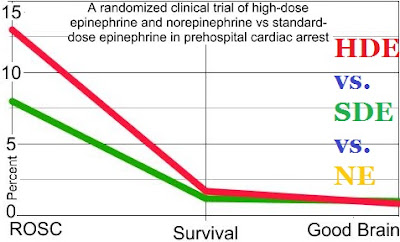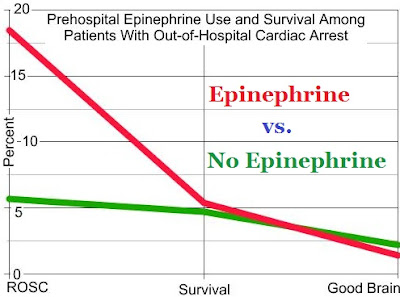Continuing from Part 1. In writing about why we should not get rid of epinephrine, Scott makes the following statement –
Patients who receive epinephrine in cardiac arrests have worse outcomes.[1]
Go read the full paragraph. I am not taking that out of context.
Scott suggests that this is acceptable, because some of these patients will be brain dead and some of those brain dead patients will end up being organ donors.
While it is true that some of those resuscitated from cardiac arrest following administration of epinephrine will end up being organ donors, should that affect our attempts to resuscitate the patient? Currently, the AHA (American Heart Association) does not encourage using treatments that may produce worse outcomes just for the purposes of increasing the number of organ donors.[2]
Even hearts can be transplanted from cardiac arrest patients can produce good outcomes.[3]
So far, so good.
Maybe it is time to look at them from a different angle. We need to look at dealing with a cardiac arrest in stages. Stage one, of course, is to work as hard as we can to achieve ROSC. ROSC is an absolute: there is a pulse, or there is not a pulse.[1]
How much harm do we do in order to get more ROSC (Return Of Spontaneous Circulation)?
ROSC is binary, but there are many ways to obtain ROSC.
The way we obtain ROSC seems to affect the survival of the patient and the brain function in those who do survive.
This is comparing three different treatments HDE (High-Dose Epinephrine), SDE (Standard-Dose Epinephrine), and NE (NorEpinephrine). The lines for the HDE and NE are so close to each other, that you may not be able to see the gold line.[4]
Compare that chart of HDE, SDE, and NE with this chart comparing Epinephrine and No Epinephrine.[5]
More ROSC, but fewer survivors.[6]
More organs, because of fewer survivors of cardiac arrest?
Is this our goal?
We could take the extreme utilitarian approach of Your organs can benefit far more people – if they are not in you.
Scott wouldn’t advocate for that with any other patient, so why head that way with cardiac arrest?
Patients who receive epinephrine in cardiac arrests have worse outcomes.[1]
Is epinephrine the cause of the harm? We do not know and we are perversely not trying to find out.
If giving epinephrine decreases survival from cardiac arrest, then giving epinephrine increases the pool of available organs at the expense of our original cardiac arrest patients. That is not the goal.
Organ donation is important. Harming patients, in order to obtain more organs, is not the goal of organ donation.
–
Footnotes:
–
[1] The Silver Lining of Epi
February 3, 2014
EMS in the New Decade
Scott
Article
–
[2] Organ Donation After Cardiac Arrest
2010 American Heart Association Guidelines for Cardiopulmonary Resuscitation and Emergency Cardiovascular Care Science
Part 9: Post–Cardiac Arrest Care
Free Full Text from AHA.
–
[3] Cardiac arrest in the organ donor does not negatively influence recipient survival after heart transplantation.
Ali AA, Lim E, Thanikachalam M, Sudarshan C, White P, Parameshwar J, Dhital K, Large SR.
Eur J Cardiothorac Surg. 2007 May;31(5):929-33. Epub 2007 Mar 26.
PMID: 17387020 [PubMed – indexed for MEDLINE]
Free Full Text from Eur J Cardiothorac Surg.
–
[4] A randomized clinical trial of high-dose epinephrine and norepinephrine vs standard-dose epinephrine in prehospital cardiac arrest.
Callaham M, Madsen CD, Barton CW, Saunders CE, Pointer J.
JAMA. 1992 Nov 18;268(19):2667-72.
PMID: 1433686 [PubMed – indexed for MEDLINE]
–
[5] Prehospital epinephrine use and survival among patients with out-of-hospital cardiac arrest.
Hagihara A, Hasegawa M, Abe T, Nagata T, Wakata Y, Miyazaki S.
JAMA. 2012 Mar 21;307(11):1161-8. doi: 10.1001/jama.2012.294.
PMID: 22436956 [PubMed – indexed for MEDLINE]
–
[6] Are We Killing People With ROSC?
Wed, 05 Jun 2013
Rogue Medic
Article
.





[…] Should we assume that epinephrine really improves the likelihood of organ donation without decreasing survival from cardiac arrest? I will discuss that in Part 2. […]